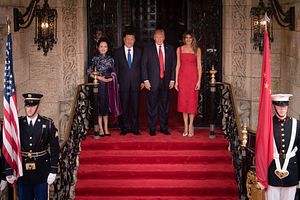Chinese President Xi Jinping held his first meeting with U.S. President Donald Trump at Mar-a-Lago Beach Resort in Palm Beach, Florida last week. India would have been closely observing the Xi-Trump meeting since Trump has given mixed signals with regard to Beijing. While on economic issues he has not minced words with China, his focus on “America First” and other comments implying a lesser role for the United States in Asia caused ample consternation in New Delhi.
India was also concerned by two other recent events impacting its bilateral relationship with the United States.
On March 31, a United States Citizenship and Immigration Services (USCIS) memo categorically stated that “an entry-level computer programmer position would not generally qualify as a position in a specialty occupation.” A number of Indian companies have been employing entry level professionals through their associate companies in the United States; now, these workers may no longer be eligible for a U.S. visa.
Second, on April 3 , U.S. Representative to UN Nikki Haley suggested that the United States was ready to intervene in the India-Pakistan dispute. “This administration is concerned about the relationship between India and Pakistan and very much wants to see how we de-escalate any sort of conflict going forward,” she said. Haley further went on to say that “I would expect that the administration is going to be in talks and try and find its place to be part of that [process].”
She added that she “wouldn’t be surprised if the president participates as well.”
This came as a surprise, because in recent years Washington has categorically stated that India-Pakistan dispute is a bilateral one. India was of course quick to respond to Haley’s remarks, and categorically stated that the Kashmir dispute is a bilateral issue and that external mediation is unwelcome.
Inspired by these two events, New Delhi would have observed the Trump-Xi meeting carefully. For any student of diplomacy and geopolitics, there were some clear takeaways.
First, New Delhi would do well to take a cue from China, which thought outside of the box, and has been cultivating the U.S. president’s son-in-law and advisor, Jared Kushner. Kushner and the Chinese Ambassador to the U.S. Cui Tiankai have built a strong rapport, which could play a positive role in the bilateral relationship. While there are significant differences between the Indian and Chinese systems, and India too has been tapping individuals close to Trump, New Delhi should try to wide its outreach, and not just depend on a few limited individuals.
Second, the phone call by Trump to Japanese Prime Minister Shinzo Abe on the eve of Xi’s visit must have come as clear encouragement to New Delhi. In the call, Trump took note of the latest missile launch by North Korea. A White House press release stated that the president assured U.S. support for Japan and South Korea against the grave threat posed by North Korea. According to the release, ‘The president also made clear that the United States will continue to strengthen its ability to deter and defend itself and its allies with the full range of its military capabilities.”
During his meeting with Xi, Trump also raised the North Korea issue. According to U.S. Secretary of State Rex Tillerson, the Chinese president took note of Trump’s concerns, and agreed that the situation “has reached a very serious stage in terms of the advancement.” Interestingly, according to Tillerson, Trump also made it amply clear that if China did not cooperate on the North Korea issue, Washington would “chart its own course.”
This emphasis on North Korea serves as a strong reiteration of the fact that Trump realizes the strategic relevance of not just alliances with countries like Japan and South Korea, but the pivotal role of the United States in the Asia-Pacific. In recent years, India has been more proactive in the Asia-Pacific, while strengthening ties with Japan and the United States. Washington has welcomed this. Given key strategic differences between Beijing and Washington DC, New Delhi’s role in the Asia-Pacific is likely to increase and the U.S. president is likely to support this.
New Delhi would do well to use Xi’s visit to study the key principles of negotiating with Trump. First, conventional diplomacy will not work with the new U.S. president. India’s Prime Minister Narendra Modi too has challenged the conventional approach toward diplomacy, and has urged Indian diplomats to not be obsessed by protocols. His recent decision to receive Bangladesh Prime Minister Sheikh Hasina at the airport reiterates that point.
Second, Trump is unpredictable, and will work to ensure that the media attention and focus is on him. Modi in this sense will not have a problem, because he too is unpredictable and has a knack for stealing the limelight, in both the foreign policy and domestic spheres. In the domestic sphere, the best instance of Modi springing a surprise was his decision to demonetize 86 percent of India’s currency on the eve of the U.S. election results.
For India, the most encouraging takeaway, however, is that while Trump may challenge the status quo, Washington will not surrender space to China in Asia. New Delhi is likely to be an integral part of Washington’s plans in this regard.
While it is not yet evident where the Xi-Trump summit will lead to in terms of the U.S.-China bilateral relationship, there are some clear lessons for New Delhi on how to deal with Trump, and clear hints with regard to the U.S. president’s approach toward the Asia-Pacific.
Tridivesh Singh Maini (@tridiveshsingh) is Assistant Professor with The Jindal School of International Affairs, O.P. Jindal Global University.

































